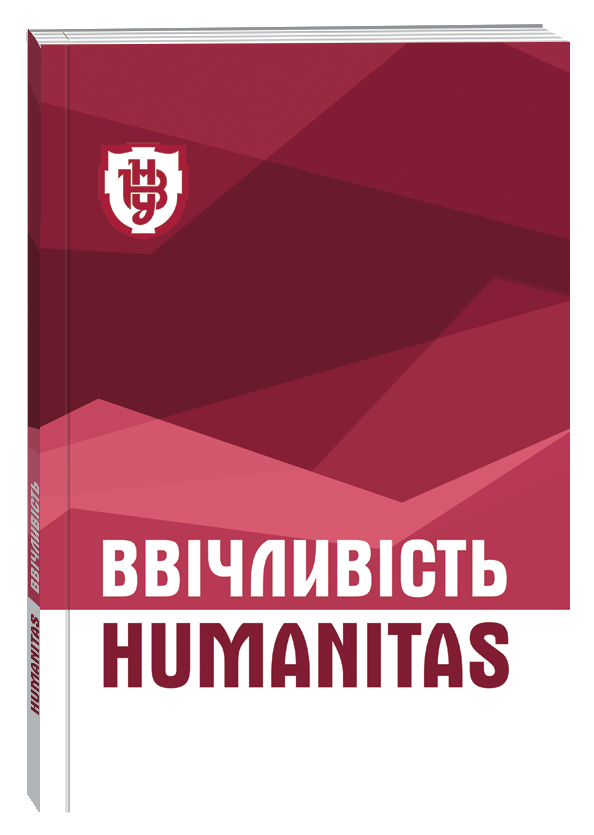PEDAGOGICAL TECHNOLOGIES OF PROFESSIONAL SELF-DEVELOPMENT OF FUTURE SOCIAL WORKERS IN THE CONDITIONS OF EXTRA-AUDIT ACTIVITIES
DOI:
https://doi.org/10.32782/humanitas/2023.5.9Keywords:
extracurricular activity, self-development of the individual, social work, social worker, institution of professional preliminary education.Abstract
The role of extracurricular work in the formation and development of students has been studied. It was found that extracurricular activities have such features as freedom of choice and independence, development of creative abilities, increased motivation for learning and self-development. The conditions for the successful organization of selfdevelopment and self-education of students have been revealed. Among them are the availability of appropriate resources (material and informational), the availability of motivation and interest in self-development, the availability of support and assistance from teachers and administration, as well as the availability of a system of evaluation and recognition of the results of extracurricular activities. The essence of the concept of "extracurricular work" and the peculiarities of students' extracurricular activities have been revealed. The conditions for the successful organization of self-development and self-education of students have been determined. The scientific sources regarding the essence of self-development of the applicant of the institution of professional preliminary higher education were studied and the analysis of the scientific and theoretical basis of the problem of self-development of the personality was carried out. The extra-auditory activity of a future specialist in the social sphere is a conscious purposeful activity aimed at developing one's own individuality and awareness of professional direction. This activity is manifested in the understanding of the importance of professional activity and the presence of a persistent interest in the profession. It contributes to the enrichment of professional knowledge, the development of skills and abilities, as well as the formation of positive professional motivation. Extracurricular activities help future specialists in the social sphere independently determine their goals and ways to achieve them, develop creative abilities and self-realize in the professional sphere. It was found that extracurricular activities have such features as freedom of choice and independence, development of creative abilities, increased motivation for learning and self-development. The conditions for the successful organization of self-development and self-education of students include the availability of resources, motivation, support of teachers and an evaluation system. The essence of the self-development of the student of the professional preliminary higher education institution and its importance in the formation of professional skills were studied. So, the problem of personality self-development and the organization of students' extracurricular activities was studied, the conditions for successful self-development were determined, and the scientific and theoretical basis of this problem was analyzed. It was concluded that extracurricular work, especially with active student participation, is an important element of active learning, as it allows students to apply their knowledge in practice, develop teamwork and leadership skills, understand social problems and implement positive changes in their society.
References
Задворняк Л.С. Організація позааудиторної роботи зі студентською молоддю як умова підвищення ефективності освітнього процесу // Сучасні інформаційні технології та інноваційні методики навчання в підготовці фахівців: методологія, теорія, досвід, проблеми. 2020. Вип 58. URL : https://library.vspu.net/jspui/bitstream/123456789/7014/1/Z_58_091-98.pdf. (дата звернення: 30.11.2023).
Децюк Т.М., Дударенко А.А. Форми та методи позааудиторної роботи студентів у вищих навчальних закладах // «Young Scientist». 2018. № 3 (55). URL : http://molodyvcheny.in.ua/files/journal/2018/3/19.pdf. (дата звернення: 30.11.2023).
Коваль В.Ю. Система позааудиторної діяльності студентів вищих навчальних закладів // Наукові праці Донецького національного технічного університету. Серія: «Педагогіка, психологія, соціологія». 2009. № 6. С. 19–23.
Ковальчук О.А. Позааудиторна навчально-виховна діяльність як організаційна форма, що здійснюється у системі змішаного навчання // Матеріали Першої Всеукраїнської науково-практичної конференції «Теорія і практика використання системи управління навчанням Moodle» (30-31.05.2013 р.). URL: https://2013.moodlemoot.in.ua/course/view.php?id =16.(дата звернення: 10.11.2023).
Козліковська Н.Я. Позааудиторна робота як складова вищої освіти // Актуальні проблеми навчання та виховання людей з особливими потребами: збірник наукових праць Відкритого міжнародного університету розвитку людини «Україна». 2015. №12. URL : https://ap.uu.edu.ua/article/512 . (дата звернення: 30.11.2023).
Остапчук В.В. Саморозвиток особистості майбутнього соціального працівника як ключова умова професійного успіху: навчальний посібник для організаторів позанавчальної роботи з дітьми та молоддю / За заг. ред. Карпенко О.Г. Житомир, 2023. 164 с.
Педагогічний словник / за ред. М.Д. Ярмаченка. Київ: Педагогічна думка, 2001. С. 167.
Про професійну (професійно-технічну) освіту щодо окремих аспектів підготовки кваліфікованих робітників в умовах воєнного стану та відновлення економіки: Закон України від 19 червня 2022 № 2312-IX. URL : https://zakon.rada.gov.ua/laws/show/2312-20#Text. (дата звернення: 30.11.2023).
Рибалко Л. С. Методолого-теоретичні засади професійно-педагогічної самореалізації майбутнього вчителя (акмеологічний аспект). Харків : ХНУ ім. Г. С. Сковороди, 2007. 443 с.
Смалько О. Позааудиторна виховна робота як чинник професійно-особистісного становлення майбутніх фахівців // Науковий вісник Східноєвропейського національного університету імені Лесі Українки. Педагогічні науки. 2014. № 8. С. 77-81. URL: http://www.irbis-nbuv.gov.ua/cgi-bin/irbis_nbuv/ cgiirbis_64.exe?I21DBN=LINK&P21DBN=UJRN&Z21ID=&S21REF=10&S21CNR=20&S21STN=1&S21FMT=ASP_meta&C21COM=S&2_S21P03=FILA=&2_S21STR=Nvvnup_2014_8_19. (дата звернення: 30.11.2023).







